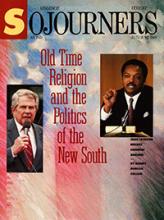During the 1960s, many people had the attitude, as singer Neil Young best summed up, "It's better to burn out than to fade away." In 1967, one young man who was both a husband and a father became so enraged by the Vietnam War that he marched up to the Washington Monument carrying a can of gasoline and in front of a group of tourists burned himself to death.
But this is the 1980s, not the 1960s, and if anything, it seems we would rather have half the happiness and twice the longevity. Or more aptly, we would rather have twice the happiness and twice the longevity. I have a friend who is a college professor, and she sometimes wonders why she never sees students protesting on campuses anymore. It seems that we have turned in the opposite direction from the '60s.
Last fall I read an article in The Washington Post Magazine about Rodrigo Rojas, a man who was killed in Chile. The article described how his mother had been tortured, and how the military guard had poured gasoline all over his body, set him in flames, and then dumped him on the side of the road to die. When I finished reading the article, I was crying. Here I was, safe in my own house, and I was so helpless to do anything. I was paralyzed. But eventually I learned that it doesn't do any good to feel this kind of guilt.
The final episode of M*A*S*H* began with Hawkeye sitting in a psychiatric ward. In all of the earlier episodes, we had seen him striving to make things right, struggling to save a patient's life or to help another doctor. The problem was that he felt responsible for everything. He tried to solve every problem, and his sense of guilt at not being able to save every patient ultimately caused him to break.
Read the Full Article

